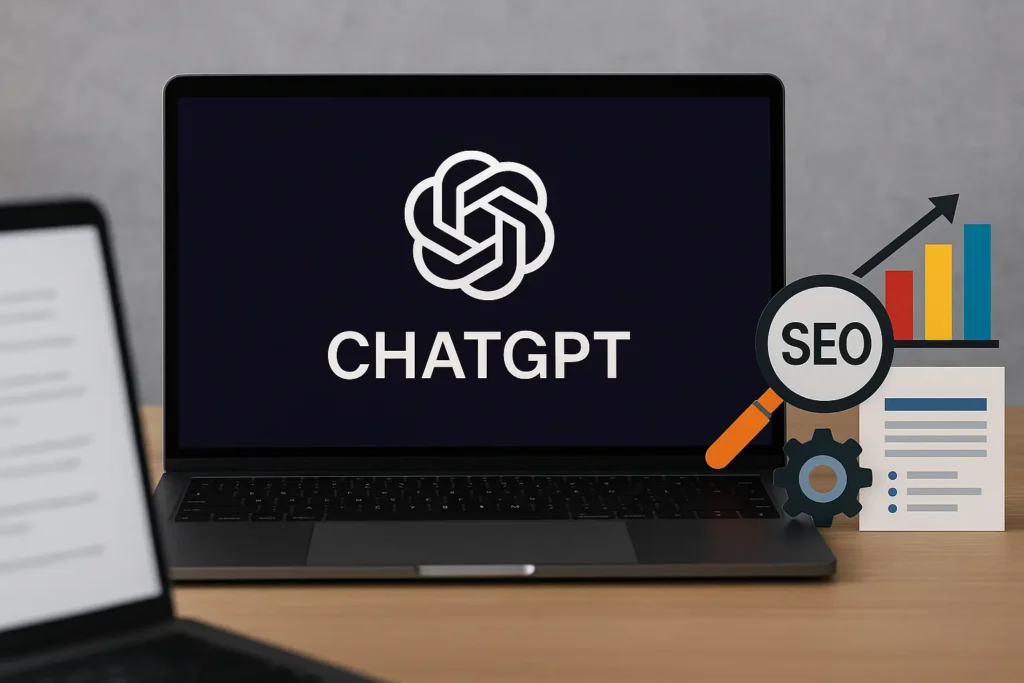ChatGPT is everywhere these days, and naturally, the world of SEO hasn’t been left out. In fact, SEO is probably one of the top fields where ChatGPT has become almost indispensable. It’s now a core tool in the arsenal of any SEO professional, and its value is massive. For example, any online marketing company in Calgary today relies on AI tools like ChatGPT to enhance productivity, generate ideas, and speed up routine SEO tasks. So, to answer the big question – can you use ChatGPT for SEO? The clear answer is – YES.
But did that really answer your question? Probably not. Because there’s a deeper, more practical question hiding underneath: Can you, an everyday business owner with little to no SEO background, use ChatGPT to promote your website and avoid spending extra money? That’s the real issue, right? I’m 99% sure it is.
So if I’ve guessed right, and you’re a business owner or just starting out online, you’re probably hoping ChatGPT will do wonders for your SEO. And I’ll tell you right now with that same 99% certainty, it probably won’t help you rank at the top of Google or get quoted in ChatGPT itself.
Why ChatGPT Won’t Work for SEO If You Don’t Know SEO
Using ChatGPT effectively depends on prompts – what you ask is what you get. But here’s the thing: if your question isn’t at the right level, the answer won’t be either. Think of it this way: if a child asks, “What is space?” you don’t respond, “It’s a hypercomplex, topologically inhomogeneous and metaphysically paradoxical continuum composed of multi-layered quantum and metaphysical interactions.” No – you explain it in a way the child can understand.
Another great comparison? The Room of Requirement in Harry Potter. “If you don’t know what it is, you’ll never find it. But if you do, all you have to do is ask.” Without the right question, you’ll get a long, generic answer – but it won’t be deep or strategic.
What You Need to Know About Using ChatGPT for SEO
Real SEO experience is key – because SEO isn’t just about content and keywords. It’s a full system: technical optimization, backlink strategy, competitor analysis, content planning, UX design, data analytics, and constantly adapting to algorithm updates. Without these parts in place, even the best-written article could end up buried on page 10 of Google.
And now, with AI Overviews in search results, traditional SEO is just the foundation. If you don’t know how to optimize for AI-generated results, you might never see the traffic or leads you were hoping for.
Here’s a simple test: ask ChatGPT to “write an SEO article about my product.” It will. But then ask yourself:
- Were the keywords chosen based on actual search volume from tools like Google Keyword Planner or SEMrush?
- Was keyword density managed properly?
- Are headers structured correctly (H1, H2, bullet lists, tables)?
- Does the content match the user’s intent?
- Is there internal linking?
- Do you track which anchor texts you’ve used before?
- Is the snippet optimized for Google’s Featured Snippets?
- What about EEAT?
Be Honest: Do You Know These Terms? Terms like “search intent,” “keyword cannibalization,” “crawl budget,” “EEAT,” or “Core Web Vitals”? If not, that’s completely understandable – SEO is a specialized field. It demands constant study, trial-and-error, and a good amount of adaptability. That’s exactly why even something as powerful as ChatGPT can’t replace a seasoned SEO pro. It’s a tool – a great one – but still just a tool.
Think of it like this: owning a toolset doesn’t make you a builder. You might be able to use a hammer, maybe even build a shed. But if you want a solid, beautiful house, you need an architect and a skilled crew. Without knowledge, you might build a shaky shack, smash your thumb with a hammer, chuck it out of frustration, break the neighbor’s window – and end up in jail.😅
The same goes for SEO. If you don’t just want to exist online, but actually get customers and grow your business, you need a professional.
Conclusion
Everything in ChatGPT starts with the right question. The better the prompt, the better the result. And the same goes for SEO. If you don’t understand the field, your prompts – and the answers you get – will be basic. Sure, you can use ChatGPT to learn, but it could take months to even figure out what to ask. And even then, without real-world experience, it still won’t be enough – because in SEO, strategy, insight, and hands-on testing are what truly make the difference.
If you’re serious about growing your site, it makes sense to consult with specialists in search engine optimization Calgary businesses trust. Tools like ChatGPT are incredibly helpful – but in the right hands.
Only to a limited extent. Without understanding SEO fundamentals – like keyword research, search intent, or EEAT – you’ll likely get generic results that won’t rank. ChatGPT can assist, but not lead the strategy.
Because good results depend on good prompts. If you don’t ask the right questions, you won’t get strategic or targeted answers. It’s like asking a vague question to a professional – you’ll get vague advice in return.
ChatGPT can assist with:
Generating blog topic ideas
Drafting content outlines
Writing meta descriptions
Structuring H1/H2 tags
Rewriting content for clarity
But it can’t do keyword research, technical audits, or competitor analysis with real data.
No, it’s just a tool.
Like a hammer doesn’t build a house, ChatGPT doesn’t build an SEO strategy. Real results come from combining tools like ChatGPT with expert insight and data-driven planning.
Absolutely.
A reputable marketing company will know how to use ChatGPT properly, pair it with expert strategy, and get results that actually move your site up in search.


